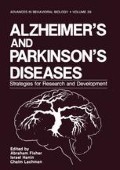Abstract
A chronic deficiency in central cholinergic function has been demonstrated in a number of neuropsychiatrie diseases, including Alzheimer’s disease.1–6 Until recently, animal models that simulate the neurochemical conditions which appear to cause these diseases in humans, as a result of a direct manipulation of the central cholinergic system, were not available. Over the past few years, however, we have been successful in developing a compound, ethylcholine mustard aziridinium ion (AF64A), which has the potential to serve as a novel toxin in developing animal models of human brain disorders in which a cholinergic hypofunction has been implicated.
Access this chapter
Tax calculation will be finalised at checkout
Purchases are for personal use only
Preview
Unable to display preview. Download preview PDF.
References
P. Davies and A.J.F. Maloney, Selective loss of central cholinergic neurons in Alzheimer’s Disease. Lancet 2: 1403 (1976).
K.L. Davis and J.A. Yesavage, Brain Acetylcholine and Disorders of Memory, in “Brain Acetylcholine and Neuropsychiatric Disease”, Plenum Press, New York and London (1978).
S. Corkin, Acetylcholine, aging and Alzheimer’s disease. Implication for treatment. Trends in Neurosci., 287 (1981).
P.J. Whitehouse, D. Price, A. Clark, J.T. Coyle, and M. Delong, Alzheimer’s disease: evidence for a selective loss of cholinergic neurons in the nucleus basafis. Ann. Neurol. 10: 122 (1981).
M. McKinney, J. Hedreen and J.T. Coyle, Alzheimer’s Disease: Report of Progress in Research, in “Aging Vol. 19”, Eds. S. Corkin, K. Davis, J. Growdon, G. Usdin and R.J. Wurtman, Raven Press, New York (1982).
R.T. Bartus, R.L. Dean, B. Beer, and A.S. Lippa, The cholinergic hypothesis of geriatric memory dysfunction. Science 217: 408 (1982).
C.R. Mantione, A. Fisher, and I. Hanin, Possible mechanisms involved in the presynaptic cholinotoxicity due to ethylcholine aziridinium (AF64A) in vivo. Life Sci. 35: 33 (1984).
A. Fisher, C.R. Mantione, D.J. Abraham, and I. Hanin, Long-term central cholinergic hypofunction induced in mice by ethylcholine aziridinium ion (AF64A) in vivo. J. Pharmacol. Exp. Therap., 222: 140 (1982).
C.R. Mantione, A. Fisher, and I. Hanin, AF64A-treated mouse: Possible model for central cholinergic hypofunction. Science 213: 579 (1981).
I. Hanin, W.C. DeGroat, C.R. Mantione, J.T. Coyle, and A. Fisher, Chemically-Induced Cholinotoxicity jji vivo: Studies Utilizing Ethylcholine Aziridinium Ion (AF64A), in “Banbury Report 15: Biological Aspects of Alzeheimer’s Disease”, Ed. R. Katzman, Cold Spring Harbor Laboratory (1983).
H.I. Yamamura and S.H. Snyder, High affinity transport of choline into synaptosomes of rat brain. J. Neurochem. 21: 1355 (1973).
C.R. Bader, R.W. Baughman and J.L. Moore, Different time course of development for high affinity choline uptake and choline acetyl transferase in the chicken ratina. Proc. Natl. Acad. Sci. (U.S.A.) 75: 2525 (1978).
H.I. Yamamura and S.H. Snyder, Muscarinic cholinergic binding in rat brain. Proc. Natl. Acad. Sci. (U.S.A.) 71: 1725 (1974).
C. Chothia, Interaction of acetylcholine with different cholinergic nerve receptors. Nature 225: 36 (1970).
J.W. Asante, A.J. Cross, J.F.W. Deakin, J.A. Johnson and H.R. Slater, Evaluation of etylcholine mustard aziridinium ion (EMA) as a specific neurotoxin of brain cholinergic neurons. Brit. J. Pharmacol. 80: 573 (1983).
A. Levy, G.J. Kant, J.L. Meyerhoff, and L.E. Jarrard, Non-cholinergic neurotoxic effects of AF64A in substantia nigra. Brain Res. 305: 169 (1984).
L.E. Jarrard, G.J. Kant, J.L. Meyerhoff, and A. Levy, Behavioral and neurochemical effects of intraventricular AF64A administration in rats. Pharmacol. Biochem. and Behavior 22: 273 (1984).
L. Villani AT Contestabile, ÂT Poli, P. Migani, and F. Fonnum, Neurotoxic effects of the presumed cholinergic toxin, AF64A. Neurosci. Lett., Supplement 18, S228 (1984).
Author information
Authors and Affiliations
Editor information
Editors and Affiliations
Rights and permissions
Copyright information
© 1986 Plenum Press, New York
About this chapter
Cite this chapter
Mistry, J.S., Abraham, D.J., Hanin, I. (1986). Structural Analogs of AF64A: Synthesis and their Effects on High Affinity Choline Transport and QNB Binding. In: Fisher, A., Hanin, I., Lachman, C. (eds) Alzheimer’s and Parkinson’s Disease. Advances in Behavioral Biology, vol 29. Springer, Boston, MA. https://doi.org/10.1007/978-1-4613-2179-8_72
Download citation
DOI: https://doi.org/10.1007/978-1-4613-2179-8_72
Publisher Name: Springer, Boston, MA
Print ISBN: 978-1-4612-9283-8
Online ISBN: 978-1-4613-2179-8
eBook Packages: Springer Book Archive

